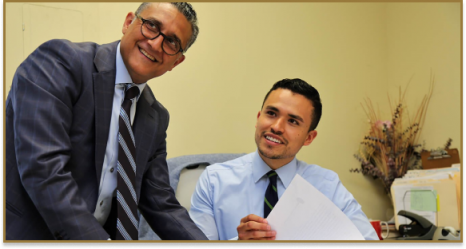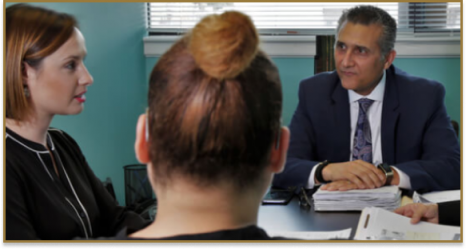Fairfax Citizenship Lawyer
Fayad Law, P.C. helps Fairfax residents make their American dreams come true by becoming naturalized citizens.
Fairfax Citizenship
If you are a lawful permanent resident of the United States, you likely want to take the next step and become a citizen. After you complete naturalization, you’ll enjoy many of the same rights granted to U.S. citizens, and you won’t have to fear deportation. While the complex naturalization process can be intimidating, Fayad Law, P.C. is here to help. Our Fairfax citizenship lawyers have more than 20 years of combined experience assisting immigrants through the naturalization process.
Our Fairfax citizenship lawyers also come from immigrant backgrounds. We understand the desire to become citizens, just as we are adept at navigating the obstacles you encounter. Contact us to find out how we can help you achieve your American dream.
Eligibility Requirements for Naturalization
You must meet the eligibility requirements to become a naturalized U.S. citizen. To become a citizen, you must be:
- 18 years of age or older
- A permanent U.S. resident for five years, or three years if you are married to a U.S. citizen
- Maintain a physical presence in the U.S. for a minimum of 30 of the last 60 months
- A Fairfax resident for at least three months
- Able to speak, read, and write in English
- Understand U.S. government and history
Why Choose Fayad Law, P.C.
- Covers All Aspects of Immigration Law – We help clients with citizenship and naturalization, appeals and bonds, asylum, and other aspects of immigration law.
- Multilingual – We are fluent in English, Arabic, French, Russian, and Spanish, allowing us to provide legal services to immigrants from around the world.
- More than 20 Years of Experience – Our experienced legal team understands the immigration system, and we use our legal experience and insight when representing our clients. Our first-hand experience as immigrants also helps our clients navigate the complex immigration system.
- Personal Attention – As a boutique law firm, we limit our caseload to ensure we can provide personal attention to each client that we serve.
- Ethical and Sound Legal Counsel – Nash Joseph Fayad has a reputation for providing ethical and sound legal counsel and was appointed to serve as Special Counsel to the Commonwealth of Virginia for all immigration matters.
Steps To Become A U.s. Citizen
Your Fairfax citizenship lawyer will help you navigate the steps you must take to become a U.S. citizen. First, you are required to submit Form N-400, along with two passport-style photos and additional documents that show that you are eligible to become a citizen. Failure to provide the necessary supporting documentation can put your application on hold. You will also need to submit your fingerprints, so you can undergo a background check.
Next, you will attend a naturalization interview. Your Fairfax citizenship attorney can prepare you for the interview with the USCIS. You will take a civics and English test at the interview and answer questions. After the interview, the USCIS will issue a decision. If your application is granted, you will need to take the Oath of Allegiance to the United States. Then, you will receive a Certificate of Naturalization.
Appealing A Denial
If your application is denied, your Fairfax citizenship lawyer will review the case to see if you have a legal basis for an appeal. If you do, he or she can file Form N-366 to appeal the decision. Your attorney can provide additional evidence to support your eligibility to become a naturalized U.S. citizen. The attorney can also go to the appeal hearing with you.
In some cases, it makes more sense to submit a new application for citizenship instead of filing an appeal. For example, crimes of moral turpitude stay on your record for five years when applying for citizenship. If your application was denied because of a crime of moral turpitude, you could reapply once your record is clear. Your citizenship attorney in Fairfax will review your case to determine if an appeal or a new application is the better path forward.
English And Civics Test
You have two chances to pass the English and civics tests during the naturalization process. If you do not pass, you will have to retake the test 60-90 days later. You will only be retested on the part of the test that you didn’t pass. You can appeal if you fail the test a second time and might be granted a third try. If you still do not pass, you will have to reapply for citizenship by filing Form N-400 once again. The USCIS provides free study materials online for you to use to prepare for your test. Your Fairfax citizenship lawyer can also provide guidance to help you through the tests.
Exceptions And Accommodations For The English And Civics Tests
It’s possible that you are exempt from the testing requirements for citizenship. For example, if you have been a permanent resident of the United States for at least 20 years and are 50 years of age or older, you don’t have to take the English test. However, you will need to take the civics test. Your Fairfax citizenship lawyer will review your case to see if you are exempt from either or both tests. If you are, your attorney will ensure that your paperwork is in order to receive the exemption.
What Sets Fayad Law, P.C. Apart?

Firsthand Experience
as Immigrants

English, Arabic, French,
Russian, Spanish, and Farsi

Proven Track
Record of Success

Personal, One-on-One
Attention

You Stay Informed
at All Times

We Strive for Client
Satisfaction
FAQs - FREQUENTLY ASKED QUESTIONS
There are dozens of different types of visas available under the provisions of the Immigration and Nationality Act (INA), but they can all be placed in one of two categories: immigrant and nonimmigrant visas. The former is for individuals who are hoping to establish permanent residency with a green card and perhaps even to pursue the path to naturalization and citizenship. The latter is for those who are only planning a temporary visit to the United States, such as for the purpose of conducting business or attending school.
The INA sets limits on the number of people who will be permitted to immigrate to the United States each year using certain types of visas, while other visas are unlimited. Family immigration visas for the immediate relatives of U.S. citizens are available on an unlimited basis, while there are annual quotas set for the relatives of lawful permanent residents and extended family of citizens, with a maximum quota of 480,000. The number of employment immigration visas is limited to 140,000 per year.
Pathways to citizenship include service in the United States military and adoption, but a large percentage of all people who become citizens do so through the process of naturalization. The basic qualifications for naturalization include:
- Living in the U.S. as a permanent resident for 5 years (or 3 years for a spouse of a U.S. citizen)
- Being at least 18 years of age
- Living within the state where you will apply for citizenship for at least 3 months prior to the application date
- Being physically present in this country for at least half of the past 5 years
- Maintaining continuous residence in this country from the date you submit your application for naturalization
- Being able to read, write and speak English
- Have a basic understanding of U.S. government and civics
It is also necessary to supply evidence that you are a person of good moral character and are attached to the principles of the U.S. Constitution. We can assist you with proving these factors, as well as preparing your petition and helping you get ready for the tests.
In June of 2012, the Obama Administration directed the Department of Homeland Security (DHS) to begin applying a policy that is referred to as Deferred Action for Childhood Arrivals (DACA). Under deferred action, DHS is exercising discretion in its execution of the laws concerning deportation and removal of immigrants who are illegally present in the United States. Deferred action is not a change to the existing law, but is instead a change in the way that the law is being applied. You may qualify for relief under DACA if you were younger than 31 years of age on June 15, 2012, came to the U.S. before your 16th birthday, have continuously resided in this country since June 15, 2007 and are either currently in school or have already graduated from high school or earned your general education development (GED) certificate, among other criteria. With deferred action, you may be able to avoid being deported, though it does not grant any change of immigration status.
In its review of immigrant visa petitions, the U.S. Citizenship & Immigration Services (USCIS) weighs factors related to the ties that the prospective immigrant has in the United States and the reasons why he or she wants or needs to come to live in this country. For example, a family immigration petition will not be approved unless the foreign national has immediate relatives such as a spouse, mother or father, child or sibling already living here as a citizen or green card holder. An employment immigration petition is more likely to receive approval if the applicant has a job offer in this country and is coming to fill a position that cannot reasonably be filled from the local labor market. A foreign national who is fleeing persecution in his or her home country may be granted an immigrant visa as a refugee or asylee.
There are many strategies for challenging a removal action. If the proposed deportation is based on a criminal conviction, it may be possible to appeal the conviction in order to have it overturned. Another option is to petition for cancellation of removal, a type of immigration relief which is available to people who are of good moral character and whose deportation would subject a family member who is a citizen or permanent resident to extreme hardship. The key to success in stopping deportation is to take immediate action by hiring a Virginia immigration attorney from our firm as soon as possible. Contact us now at Fayad Law, P.C. for a confidential consultation and to let us get started on your case!
Fayad Law, P.C. maintains offices in Richmond and Fairfax, Virginia. We work with individuals, families, and businesses across the world, providing them with assistance in resolving the legal issues involved with helping their loved ones and employees to immigrate to the United States. We work directly with foreign nationals living abroad, guiding them through the process of obtaining immigrant and nonimmigrant visas for entry to the U.S.
Real Clients, Real Testimonials
Contact Us Today
Have questions about your rights? Ready to discuss your immigration case? Contact Fayad Law, P.C. now.



















